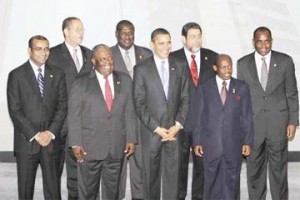US President Barack Obama will meet Caribbean leaders later this year to follow up on bi-lateral discussions at the Fifth Summit of the Americas, as the US renews its strategy of partnership in the region.

Since establishing that he is in Trinidad seeking a new chapter of engagement in the hemisphere, the US leader has agreed to meet regional leaders in Washington later this year.
Guyana’s President Bharrat Jagdeo, who led the regional discussions with Obama, praised Obama’s new approach saying that the US President engages on a different level. He noted that Obama listened and responded to every single point raised in the regional talks, adding that “it’s a welcome departure from past engagements.”
High on the agenda with Obama was the need for the US to better understand the peculiarities and vulnerabilities of region, according to Jagdeo, as well as the impact of international trade decisions on the small open economies.
Vulnerabilities
Jagdeo said that the initial focus of the discussions was on the region’s vulnerability to natural disasters, and he recalled explaining to Obama how a single natural disaster can easily wipe out close to eighty percent of the Gross Domestic Product (GDP) of countries in the region, and that governments are forced to start all over again. “…It was important to stress our peculiarities and to explain to Mr Obama how different we in the region here are,” Jagdeo stated.
Jagdeo raised the global financial crisis but focused on how the US President can help to restructure the international financial institutions to be more responsive to the needs of the region. He emphasized the need for a change in the instruments such as how they lend or extend grants and the cost of borrowing to the issue of flexibility.
According to the President, the Caribbean Basin Recovery Act also came up and the region recommended that the coverage be extended to additional products.
The issue of climate change, which Jagdeo has taken a lead on within the region, also came up and Jagdeo called on Obama to commit to deep emission cuts ahead of Copenhagen, “so as to make the meeting in December successful.” Jagdeo described the exchange on climate change as a good one.
Cuba
Cuba was also on the agenda and according to Jagdeo, the region reiterated its position for an end to the embargo while applauding the move by the US government to lift travel restrictions and open the flow of remittances. Jagdeo said he also spoke of the historical injustice of the embargo in issuing the region’s call for the removal of the embargo.
Jagdeo continued that while Cuba is important in the ongoing discussions it does not dominate the summit. He added that the region welcomed the call by both US and Cuba for renewed dialogue.
Further, he said that the region made known the tremendous support that Cuba has shown it in the areas of education and health. He said too, that the issue of Haiti came up and that the region stressed the need for urgent attention to be shown to the country.
‘Inaccurate’
Jagdeo said he raised the issue of US State Department reports (on Guyana) that “are inaccurate.” He said he mentioned that the reports on drug trafficking and trafficking in persons generate conflict and come over as lectures when they should instead reflect cooperation between the two countries.
He said the US President immediately turned to his Secretary of State, Hillary Clinton and indicated that they can address some of the issues raised.
Meanwhile, Jagdeo deflated the idea of any tension between Venezuelan President Hugo Chavez and Obama saying that he observed them in the Unions of the States of the Americas (UNSUR) and that they were cordial and “very respectful”.
Responding to a question from a reporter about what makes the summit in Trinidad different from the others, Jagdeo said that it was Obama’s presence. He noted too, that the Caribbean has a strong voice and that the summit offers the opportunity for the hemisphere to work towards the kind of mutual and respectful relationship that Obama spoke of.
By Iana Seales at the Summit of the Americas, Trinidad and Tobago





